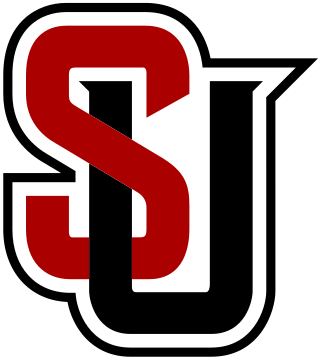History
Between 1950 and 1971, Seattle competed as an NCAA Division I independent, then joined the West Coast Athletic Conference (now West Coast Conference) in 1971. [4] The Chieftains gained national attention in early 1952 when the basketball team defeated the Harlem Globetrotters. [5] [6] Seattle was led by the O'Brien twins, Eddie and Johnny, of South Amboy, New Jersey; Johnny became the first college player to score 1,000 points in a season and both were named All-Americans. The 5 ft 9 in (1.75 m) twins led Seattle to the NIT in Madison Square Garden in 1952, [7] and then onto its first NCAA Tournament berth in 1953. The O'Briens were selected in the 1953 NBA draft by the Milwaukee Hawks but were also standouts in baseball. [8] Upon graduation, Eddie and Johnny opted for the diamond and played together in the major leagues with the Pittsburgh Pirates from 1953 to 1958. Eddie (1930–2014) was later the baseball coach and athletic director at SU. [9]
Seattle has eight wins (plus two consolation game victories) in eleven NCAA basketball tournament appearances (all from 1953 to 1969); [10] half of the wins came in 1958 when the Chieftains advanced to the championship game at Freedom Hall in Louisville, Kentucky, [11] against the University of Kentucky. [12] Seattle was led by consensus All-American and future NBA Hall of Famer Elgin Baylor of Washington, D.C., who was named most outstanding player of the tournament. In the semifinal on Friday night against tournament favorite Kansas State, he scored 23 points and grabbed 22 rebounds as Seattle won by 22 points in an upset rout, 73–51. [11] In the final the next night, John Castellani's Chieftains led by three points at the half, but Baylor soon picked up his fourth personal foul, which limited his effectiveness in the second half and Adolph Rupp's Wildcats won by a dozen, 84–72. [12] [13]
During a period in the 1960s, Seattle led the nation with the number of active players in the NBA. Notable basketball alums include Eddie Miles, Tom Workman, Rod Derline, and Clint Richardson, who won an NBA title with the Philadelphia 76ers in 1983. Tennis player Tom Gorman led SU before leading the USA Davis Cup teams in the 1970s. Janet Hopps (tennis) and Pat Lesser (golf) were trailblazers in the advancement of women's sports in the 1950s competing nationally as a part of the men's teams. Seattle native Ruth Jessen attended for a year and was a top LPGA tour player in the 1960s.
In 1953, Patricia Lesser won the women's individual intercollegiate golf championship (an event conducted by the Division of Girls' and Women's Sports (DGWS) — which later evolved into the current NCAA women's golf championship).
In March 1980, due to a recession that crippled the region, the administration contemplated dropping intercollegiate athletics. [14] Two months later, SU voluntarily downgraded its athletic program from NCAA Division I to the small college NAIA, [15] [16] [17] the Chieftains competed at this level for the next 21 years.
Under the leadership of university president Stephen Sundborg, SJ, Seattle changed its nickname from Chieftains to Redhawks in January 2000. [18] [19] Seattle rejoined the NCAA in 2001 and competed in Division III for a year, then in Division II from 2002 to 2009. [20] [21]
For the 2009–10 academic year, Seattle's varsity teams played full schedules against Division I opponents. Although it was then a Division I independent, the university had initially hoped to rejoin the West Coast Conference (where they played before leaving the NCAA in 1980), since all nine current members were private, religiously affiliated institutions (seven are Catholic and four share Seattle University's Jesuit affiliation). Seattle also explored membership in the Big Sky Conference, although all of its members played FCS football.
Seattle once again became eligible for Division I NCAA Championships beginning in 2012–13, and is a full Division I-AAA member (no football) in all 20 sports. [22]
During the 2010–14 NCAA conference realignment, the Western Athletic Conference (WAC) saw a large number of their members leave. From 2011 to 2013, twelve schools left the WAC. In June 2011, the WAC invited Seattle to join as a full member beginning July 2012. Seattle accepted soon after for all of the sports it sponsors at the varsity level except rowing, which the WAC does not sponsor and, initially, men's swimming and diving, which the WAC did not sponsor at the time. Men's swimming and diving was added as a WAC-sponsored sport in 2013. [23] The conference dropped football after the 2012 season and in the summer of 2013, only three members from the prior year remained in the conference (Seattle, New Mexico State, and Idaho). The WAC added six new members in 2013, and when Idaho returned to the Big Sky in 2014 (& Sun Belt for football), Seattle became the second-longest tenured WAC school after just three seasons in the league. Since joining the conference, the Redhawks have claimed five team titles and three individual titles, and have had four student-athletes named player of the year.
Stephanie Verdoia, women's soccer forward, was named two-time WAC Player of the Year, two time Academic All-American and was named an All-American and the Academic All-American of the Year for women's soccer in 2014. Verdoia also received the Senior CLASS Award as the sport's top scholar-athlete nationally and was the named the 2015 Seattle Sports Commission Female Sports Star of the Year.
In 2018, Seattle University's board of trustees renamed the Connolly Complex to the Redhawk Center due to Archbishop Thomas Connolly's failure to act on a known abusive priest. [24]








